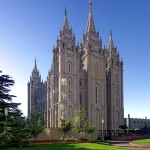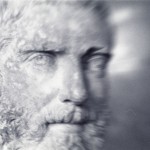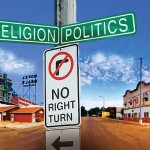This is a mutli-part series. In this part, I discuss the history of Unitarianism, including the Transcendentalist revolt, the humanist revolution, and the search for a language of reverence.
A few weeks ago, a married couple who are friends of mine joined the Unitarian Universalist congregation that I attend. They have been attending for about as long as I have, I think — about 2 1/2 years. I have not joined, and my friends’ decision has me asking myself why not. In my relatively short time with this congregation, I think I have come to experience first hand why UUism is a failure in the religious marketplace. I write this with a great deal of love for the UU and with every intention of continuing to attend and support my congregation financially. But I have come to the conclusion that there is something fundamental missing from the UU experience.
UUism today is the practical manifestation of a long history of philosophical rationalism and humanism. The roots of the religious humanism which characterizes the UU can be traced back the Enlightenment, to Kant’s “religion within the bounds of reason alone”, the deists, Comte’s Religion de l’Humanité, Locke, and the “Cult of Reason” of the French revolution. In the late 18th century, this process manifested as the “Unitarian Controversy” in England and the United States, in which Congregationalism split between liberal (Unitarian) and conservative (Calvinist) polities. Unitarianism was a reaction to the Calvinist Christianity of its day and its doctrine of human depravity and the excessive emotionalism of evangelicals of the Second Great Awakening. It was also driven, in part, by higher Biblical criticism. During its formative period in the United States, Unitarianism was marked by its rationalism, increasing rejection of the supernatural (miracles) and Biblical textual authority, optimistic humanism, and a focus on social activism. The Unitarian split became formal in 1819, when William Ellery Channing delivered his sermon “Unitarian Christianity”.
Something missing …: The Transcendentalist Revolt
However, not long after its beginnings, Unitarianism came under attack from within. No less than William Ellery Channing, who may fairly be said to be the founder of Unitarianism in America, wrote in 1820 that Unitarians had overemphasized the mind over the heart and soul, reason over the imagination and “poetic enthusiasm”.
“I wish to see among Unitarians a development of imagination and poetic enthusiasm, as well as of the rational and critical power … I think Unitarianism has suffered from union with a heart-withering philosophy. … it has suffered also … from a too partial culture of the mind. I fear that we must look to other schools for the thoughts which thrill us, which touch the most inward springs, and disclose to us the depths of our own souls.”
(1820 correspondence to Mrs. Cappe, recorded in The Memoir of William Ellery Channing, vol. 2).
The Transcendentalists reached the same conclusion a generation later:
“In many respects, Transcendentalism was a generational revolt from Unitarianism, which itself had split off from Calvinism only a generation before. The liberals had broken with the Calvinists on largely rational grounds. And now the Transcendentalists were protesting a lack of religious feeling and enthusiasm among the Unitarians because of an exaggerated rationalism.”
Barry Andrews, “The Roots of Unitarian Universalist Spirituality in New England Transcendentalism”.
Emerson resigned from the Unitarian ministry in 1832 and had a few choice words for the Unitarianism of his day, calling it “corpse-cold” (Complete Works, 10:552). In 1878, he wrote about the religion of his time:
“A sleep creeps over the great functions of man. Enthusiasm goes out. In its stead a low prudence seeks to hold society staunch, but its arms are too short, cordage and machinery never supply the place of life.
“Luther would cut his hand off sooner than write theses against the pope if he suspected that he was bringing on with all his might the pale negations of Boston Unitarianism. … To a self-denying, ardent church, delighting in rites and ordinances, has succeeded a cold, intellectual race, who analyze the prayer and psalm of their forefathers, and the more intellectual reject every yoke of authority and custom with a petulance unprecedented.”
(“The Sovereignty of Ethics”). These words carry all the more force when you consider they were penned by the same iconoclast who famously wrote: “Why should not we have a poetry and philosophy of insight and not of tradition, and a religion by revelation to us, and not the history of theirs?” (“Nature”, Introduction).
Transcendentalist Unitarian, Theodore Parker, believed that the core of religion should be individual experience. In 1859, he wrote that a focus on morality (ethics) and social justice had replaced concern with what he called “piety” (which in today’s parlance might be called “reverence”):
“I count it a great fortune that I was bred among religious Unitarians, and thereby escaped so much superstition. But I felt early that the ‘liberal’ ministers did not do justice to simple religious feeling; to all their preaching seemed to relate too much to outward things, not enough to the inward pious life; their prayers felt cold; but certainly they preached the importance and the religious value of Morality … I think it will be found that all the great moral and philanthropic movements in the State [of Massachusetts]–social, ecclesiastical, and political–from 1800 to 1840 have been chiefly begun and conducted by the Unitarians. …
“But yet while they had this great practical excellence, … I thought they lacked the deep internal feeling of piety, which alone could make it lasting … This fact seemed clear in their sermons, their prayers, and even in the hymns they made, borrowed, or ‘adapted.’ Most powerfully preaching to the Understanding [the Transcendentalist word for “Reason”], the Conscience, and the Will, the cry was ever, ‘Duty, Duty! Work, Work!’ They failed to address with equal power the Soul, and did not also shout, ‘Joy, Joy! Delight, Delight!’
“This defect of the Unitarians was a profound one. … ceasing to fear ‘the great and dreadful God’, they had not quite learned to love the … Universe. But in general they had no theory which justified a more emotional experience of religion. … Surely a party with no better philosophy, and yet rejecting instinct for guide, … could produce a deep and continuous action of the religious element in the mass of its members …
“It is a dismal fault in a religious party, this lack of Piety, and dismally have the Unitarians answered it; yet let their great merits and services be not forgot.”
(Theodore Parker, Experience as a Minister (1859)).
I too consider it a great fortune to worship with those who reject superstition and I would not have the virtues of Unitarians forgotten. But like Channing, Emerson and Parker, I feel that Unitarian worship lacks a “poetic enthusiasm” and deep religious reverence.
It is interesting that both Emerson and Parker mentioned Unitarian hymns. I think a religion’s hymns can tell you a lot about its soul. Today, the UU hymnal is an eclectic collection. I struggle the most with the old stodgy 19th century Unitarian hymns. Some of the hymns I like the best are from other traditions: the African-American spirituals, like “There is More Love Somewhere” (#95) and “When the Spirit Says Do” (#1024), “Bring out the Festal Bread”(#120), based on a Hebrew folk song, Gilu Hagalilium (which we sang for Passover), and most recently, Alhamdulillah (#180) (which we sang for Ramadan). I would agree with Channing (above) that Unitarians “must look to other schools [and traditions] for the thoughts [and music] which thrill us, which touch the most inward springs, and disclose to us the depths of our own souls.”
Orestes Brownson, a former Transcendentalist and convert to Catholicism, wrote (somewhat polemically) in his 1857 memoir:
“[Humankind is] beginning to understand that Protestantism is no-churchism, is no positive religion; and while it serves the purpose of criticism and destruction, it cannot meet the wants of the soul, or erect the temple in which the human race may assemble to worship in concord and peace. Unitarianism has demolished Calvinism, made an end in all thinking minds of everything like dogmatic Protestantism, and Unitarianism itself satisfies nobody. It is negative, cold, lifeless, and all advanced minds among Unitarians are dissatisfied with it, and are craving something higher, better, more living and life-giving. They are weary of doubt, uncertainty, disunion, individualism, and crying out from the bottom of their hearts for faith, for love, for union. They feel that life has wellnigh departed from the world; that religion is but an empty name, and morality is mere decorum or worldly prudence; that [humankind] neither worship[s] God, nor love[s] one another. Society as it is, is a lie, a sham, a charnel-house, a valley of dry bones. O that the Spirit of God would once more pass by, and say unto these dry bones, ‘Live’! So I felt, so felt others; and whoever enjoyed the confidence of the leading Unitarian ministers in Boston and its vicinity from 1830 to 1840, well knows that they were sick and heart with what they had … [Humankind] had pronounced the everlasting ‘No.’ Were they never to be able to pronounce the everlasting ‘Yes’?”
(Orestes Brownson, The Convert (1857)).
A generation later, Unitarian minister, John Trevor, would write in his autobiography about his time studying at the Unitarian Meadville seminary in the late 1870s with a mixture of gratitude and disappointment:
“My respect for individual Unitarians is unbounded. And yet their religious position as a denomination is one which I have always deeply regretted. For want of something, I know not what, all their freedom, all their knowledge, all their generosity, all their high personal character— everything which seems to mark them out as the one denomination to lead the van of religious and social emancipation—never comes to the point of making them a great reforming power. People, with qualities in many respects far inferior to theirs, are moving the world to-day; while they, perplexed and pained as they are, and anxious to find the road by which they may march forward, are scarcely able to maintain the status of their own churches.
“It is with unspeakable sorrow that I write this. Again and again have I felt deeply depressed by the Unitarian situation. […] To throw off the trammels of the past is not enough; there must be the prophetic insight into the future. But not even the trammels of the past are quite thrown off. Unitarianism does not mean Free Religion; it means Free Christianity. It is the last word of the Old Gospel, sifted small through the riddle of the Intellect; not the first word of the New Gospel, bursting up irresistibly from the Spirit. […]
“There is one needful thing to Unitarians. God alone knows what it is, but he does not tell them. Is it for want of their asking? […]
“From the general tenor of their preaching you would suppose that living Faith might now give way to enlightened religious opinion—that enthusiasm and personal abandonment were no longer characteristics of divine fellowship.”
John Trevor, My Quest for God (1910).
Trevor is someone I closely identify with and his experience of Unitarianism is no exception. I remember the first time I read Trevor’s description of Unitarianism, I felt as if I were reading about my local UU congregation. Even though Trevor was writing about Unitarianism 130 years ago, his observations are still timely, including the one about Unitarians being “scarcely able to maintain the status of their own churches”. By the last measure, UU membership is shrinking. There are currently 162,800 members, down 1,400 from the previous year. Even more disturbing to me, as a parent bringing my children to the UU, is the statistic that approximately 95 percent of those raised UU eventually disaffiliate. (Lee, 1995).
What strikes me about Trevor’s description of Unitarianism was his observation that there seemed to be something missing from Unitarianism, something undefinable yet essential. Trevor hints that it might be related to “enthusiasm and personal abandonment”, using similar terms to those used by the Transcendentalists (above). I’ve written about this before in my post, “Why Unitarians can’t dance”. By “enthusiasm”, I don’t mean mere emotional excitement — there is plenty of “enthusiasm” for social justice in the UUA, for example. Rather I mean enthusiasm in its original sense of enthousiasmos, the state of being possessed by a god.
The Humanist Revolution: Religion as ethics
The Transcendentalist Revolt ultimately did not alter the course of rationalist Unitarianism. Like Protestantism generally, which was strongly influenced by the liberal theology of Albrecht Ritschl at the end of the 19th century (or what has been called “Culture-Protestantism”) and the Social Gospel of Walter Rauschenbusch at the beginning of the 20th, Unitarianism fought a war of attrition against the progress of scientific inquiry. The result was a “God of the gaps” and religion reduced to mere ethics. In the 1920s and 1930s, Unitarianism doubled-down on its commitment to rationalism by embracing the humanist movement. Ironically, the Transcendentalists had felt the liberal Christian Unitarians of their day were over-emphasizing rationality, but it was the rationalism of the 20th century humanists which ultimately transformed the Unitarian church into the post-Christian organization it is today.
To understand religious humanism, we can look the first Humanist Manifesto (1933) (especially paragraphs 8-10 and 12-13) and the “Religion” subheading of the second Humanist Manifesto (1973). Among the signers of the first Humanist Manifesto were several Unitarian ministers, including John Dietrich, who has been called the father of religious humanism. Religious humanism, as explained in these documents, seeks to define religion solely in human terms. It denies any belief in the supernatural. As there are no supernatural guarantees of human values, any discussion of values must begin and end, not with God, but with human beings and their needs and experiences.
However, it is what is unstated in the Manifestos that concerns me here. The unstated assumption in the first Manifesto is that religion is all about belief and ethics. When superstitious belief is replaced by scientific inquiry, then only ethics is left. Thus, religion is reduced to ethics. This assumption becomes more explicit in the second Manifesto:
“In the best sense, religion may inspire dedication to the highest ethical ideals. The cultivation of moral devotion and creative imagination is an expression of genuine “spiritual” experience and aspiration. …
“We appreciate the need to preserve the best ethical teachings in the religious traditions of humankind, many of which we share in common. But we reject those features of traditional religious morality that deny humans a full appreciation of their own potentialities and responsibilities. Traditional religions often offer solace to humans, but, as often, they inhibit humans from helping themselves or experiencing their full potentialities. Such institutions, creeds, and rituals often impede the will to serve others. Too often traditional faiths encourage dependence rather than independence, obedience rather than affirmation, fear rather than courage. More recently they have generated concerned social action, with many signs of relevance appearing in the wake of the ‘God Is Dead’ theologies.”
In practice, this means that, “in the place of the old attitudes involved in worship and prayer the humanist finds his religious emotions expressed in a heightened sense of personal life and in a cooperative effort to promote social well-being.” As I read this, I cannot help but think that there is something essential in the “old attitudes” that is lost when religion is reduced to “cooperative effort to promote social well-being”.
While on the one hand, the humanists can be seen as rejecting the Christianity of the liberal Unitarians who preceded them, in another way religious humanism was just a continuation of the rationalism which had begun with the Enlightenment and had continued through the Unitarian Controversy and into the 20th century. The assumption that religion is about belief and ethics is precisely what the Transcendentalists like Parker took issue with a century earlier when they bemoaned how concerns for social justice had replaced personal experiences as the core of the Unitarian experience.
The result of the Humanist Revolution is the same lack of enthusiasm and personal abandonment which characterized the liberal Unitarian Christianity of the previous century, but now stripped of its Christianity. Today, the UUA is probably the most conspicuous representative of religious humanism. The statement of UU Principles proclaims that UUism draws upon diverse sources, the first of which is: “Direct experience of that transcending mystery and wonder, affirmed in all cultures, which moves us to a renewal of the spirit and an openness to the forces which create and uphold life.” However, as I wrote in my previous post, I find very little affirmation of that “transcending mystery” in my UU congregation. In fact, when it is spoken of, it seems to be with embarrassment and hesitation.
A Language of Reverence
UUism has recently trying to raise some enthusiasm by seeking what has been called the “language of reverence” or “vocabulary of reverence”, prompted by a 2003 sermon by the then-president of the UUA, Rev. William Sinkford, entitled “The Language of Faith. In a follow up essay, Sinkford asks whether Unitarians “can name the holy”. “Can we speak of that which transcends our ego and which calls us to the making of justice? Can we speak about God?” (“Language of Reverence: A Response”). Sinkford’s controversial sermon was inspired by David Bumbaugh’s earlier 2001 sermon, “Toward a Humanist Vocabulary of Reverence”. In it, Bumbaugh claimed that a “vocabulary of reverence” was native to the humanists who authored the first Manifesto:
“[Over time] Humanists accepted the charge that they were secularists, materialists, rationalists and the implacable foes of the spiritual and emotional qualities that romanticized religion emphasized. Living under this imposed definition, Humanism gradually lost the vocabulary of reverence that I believe had been the native tongue of the signers of the Humanist Manifesto.”
The discussion has been carried on by Bumbaugh and others, and you can find some of it in A Language of Reverence, ed. Dean Grodzins (2004). Additional sermons and essays can be found here.
I am encouraged by this discussion in the UUA, because it indicates an awareness that something is missing from UUism. But the terms in the discussion is framed are equally worrisome. Note that it is a “language” or a “vocabulary” that Sinkford and Bumbaugh are looking for — should we not instead be looking for an experience, which would then give rise to the language?
In 1979, the then-president of the UUA, Gene Pickett, observed in his inaugural address:
“The old watchwords of liberalism–freedom, reason, and tolerance–worthy though they may be, are simply not catching the imagination of the contemporary world. They describe a process for approaching the religious depths but they testify to no intimate acquaintance with the depths themselves. If we are ever to speak to a new age, we must supplement our seeking with some profound religious finds.”
It seems very little has changed in the UUA since 1979. In fact, it seems very little has changed since 1879 or even 1829. It is not a problem of religious language that plagues UUism, but a problem of religious experience. If we could find the experience, then the words would come. If the church does not exist to help create the conditions for that experience, then why call it a church? On Sundays, I often feel as if I am attending, not a religious service, but a meeting of some ethical fellowship, a “cooperative effort to promote social well-being”.
In Part 2, I will discuss liberal Protestantism more generally.
Additional Sources
Grenz, Stanley J. & Olsen, Roger E. 20th Century Theology: God and the World in a Transitional Age (1992)
Howe, Daniel Walker. “At Morning Blest and Golden-Browed: Unitarians, Transcendentalists and Reformers, 1835–1865”, in A Stream of Light: A Sesquicentennial History of American Unitarianism, ed. Conred Wright (1989).
Lee, Richard Wayne. “Strained Bedfellows: Pagans, New Agers, and “Starchy Humanists” in Unitarian Universalism”, in Sociology of Religon, vol. 56, no. 4, pp. 379-396 (1995).
Lorenzen, Thorwald. Resurrection and Discipleship: Interpretive Models, Biblical Reflections, Theological Consequences (2004)
Neibuhr, Gustav. “Unitarians Striking Chord of Spirituality”, New York Times, Dec. 8, 1996.
Price, Robert M. “Postmodern Unitarian Universalism” (2004)
Webb, R.K., “Miracles in English Unitarian Thought”, in Enlightenment, Passion, Modernity: Historical essays in European thought and culture, eds. Mark S. Micale, Robert L. Dietle, Peter Gay (2000).















